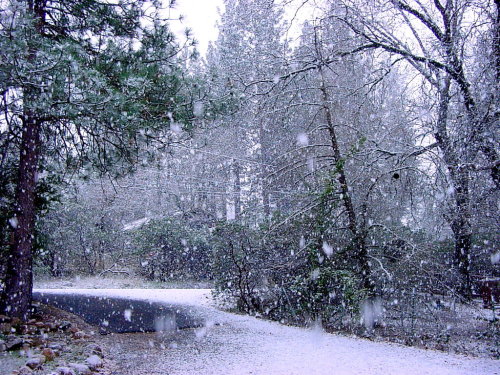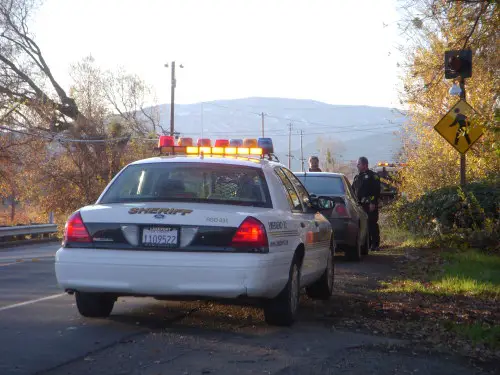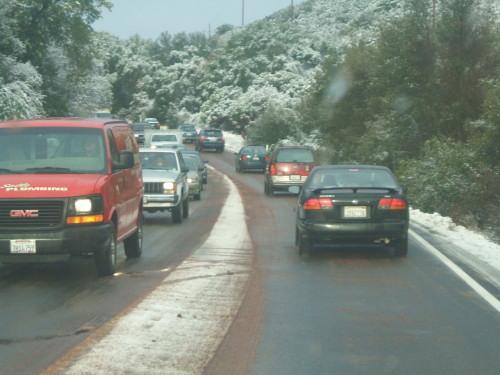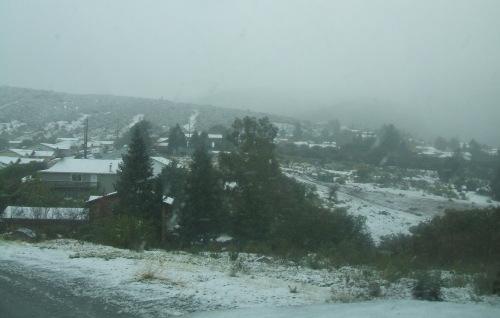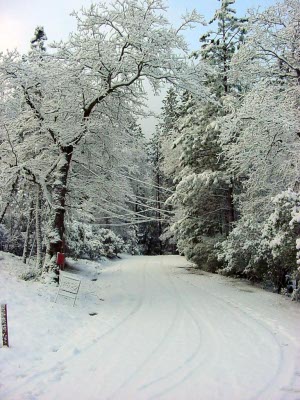ROBINSON RANCHERIA – Late last week, certified letters that dozens of Robinson Rancheria Band of Pomo tribal members were dreading began to arrive.
Sent out to several dozen Pomo, the envelopes contained resolutions for each person, passed in a 3-0 vote held by the Robinson Rancheria Citizens Business Council on Dec. 5, informing them that they had been disenrolled from the tribe and their names removed from its rolls.
The resolutions were signed by Tribal Chair Tracey Avila and Secretary-Treasurer Kim Fernandez on Dec. 10.
Avila had previously told Lake County News that 60 of Robinson's 347 tribal members had been under consideration for disenrollment.
On Tuesday, she said six people had proved their lineage and so were allowed to retain their tribal membership, while several more had asked for special consideration to be able to secure documents proving their lineal descent from tribal members on the tribe's original rolls.
EJ Crandell, who was elected tribal chair in June in an election that was decertified by the tribe's election committee, has asserted that as many as 74 tribal members faced disenrollment, and supplied Lake County News with a list of about 50 names of people who he said had confirmed receiving the disenrollment resolution.
Crandell's wife's family was among those disenrolled. He said he's concerned that he and his immediate family may be next.
Gone for the people receiving the resolutions are free access to the rancheria, health care services, food services for homebound seniors, pensions and per capita payments funded by Robinson Rancheria Resort and Casino.
Some were fired from jobs before the disenrollment resolutions were approved, which Crandell and other tribal members critical of the council said were retaliatory actions. Avila denied that, saying the firings were based on poor job performance and were unconnected to the tribe's action.
Most of the disenrollees don't live on the rancheria, said Avila. Those who do live on the rancheria are concerned about losing their homes, but Avila said the tribe doesn't plan to take action to remove them because the homes were funded through a program that supports Indian housing. “We can allow them to live there,” she said.
Among those removed from the rolls include the entire 35-member Quitiquit family, which includes decorated veterans, and traditional artisans and basket makers.
Avila said the people who were disenrolled have been “on the table for many, many years.”
The council changed its enrollment ordinance because it conflicted with the tribe's constitution, said Avila. A provision in the enrollment ordinance was removed that had allowed for membership in the tribe through adoption of individuals whose names appeared on a 1940 tribal census roll and their lineal descendants.
Avila said the council is trying to clean up its ordinances in order to stabilize operations.
She traces the tribe's issues with its rolls back to termination of tribes in the 1950s and 1960s, when many tribes lost land and federal recognition. Many Indians didn't have a place to go and some were adopted into other tribes, such as Robinson.
Avila said the tribe has to take care of its own members first before they can help anyone else. The goal is to use the proceeds from Robinson Rancheria Resort and Casino to help the tribe, but Avila said the casino – while it's an important revenue source – doesn't pull in the kind of business found among the bigger gaming tribes' casinos.
Crandell and other opponents of the disenrollments allege that Avila and the rest of the business council – Curtis Anderson Jr., Kim Fernandez, Stoney Timmons, Nicholas Medina and Buffy White – are taking the actions ahead of a January election for the tribal leadership. They said the members who are disenrolled supported Crandell's election.
Avila denies that. “It just happened at this time,” she said. “I wish this had been dealt with earlier.”
Also just taking place are additional payments to existing tribal members, who reportedly each received $400 checks in the last few weeks. Avila said those payments are not connected to the disenrollments.
She said she considers the disenrollments an internal tribal matter, and doesn't understand why anyone outside of the tribe should be concerned about it.
Are more disenrollments planned? “As far as I know, no,” said Avila.
Group meets to rally disenrollees
On Saturday, the American Indian Rights and Resources Organization – AIRRO for short – held a board meeting in Upper Lake to discuss strategy for assisting the tribal members who received the disenrollment resolutions.
AIRRO President John Gomez, whose family was disenrolled by the Pechanga tribe, is helping lead the families through the process of appealing their cases to the Bureau of Indian Affairs.
Robinson Rancheria's 1980 constitution calls for the Bureau of Indian Affairs' involvement with determining tribal membership.
Article 3, Section 3 states: “The official membership roll shall be prepared in accordance with an ordinance adopted by the governing body and approved by the Secretary of the Interior or his authorized representative. Such ordinance shall contain provisions for enrollment procedures, enrollment committees, application form, approval or disapproval of application, rejection notice, appeals, corrections and provisions for keeping the roll on a current basis.”
In his experience – both personally and working with AIRRO – Gomez said disenrollments usually occur before important tribal elections.
The other important function of the Saturday AIRRO meeting was to offer hope and support to people whose worlds have been turned upside down by the tribe's actions.
AIRRO Chair Carla Foreman-Maslin, along with her husband, Mark, and her brother, Bobby, traveled from the Redding area for the meeting.
Foreman-Maslin is the daughter of the late Bob Foreman, Redding Rancheria's first tribal chair, who died last month at age 72. The 76-member Foreman family was disenrolled from the Redding Rancheria in 2004 after other tribal members began circulating a rumor questioning their lineage.
“We thought we were the only ones,” Foreman-Maslin said. “I'd never heard of disenrollment.”
Foreman-Maslin wept as she recounted how, at the request of tribal leadership, her family exhumed the bodies of her grandmother and great-great-grandmother in order to prove their lineage through DNA testing. The family was stripped of its tribal membership despite those tests proving their ancestry.
“To have to do that and live with this recurring nightmare is wrong,” she said.
AIRRO was born when the Foremans and other tribal members hit by disenrollments came together to unify and fight for Indians' civil rights, she said.
“It hurts your whole core, your heart, your spirit,” she said of the pain of being alienated from her tribe.
Gomez agreed about the pain and the trauma disenrollment leaves in its wake.
“You never get used to this, even though we've lived through it. You never get used to this, even when it happens to other people,” he said.
He said he and other AIRRO members realize it's their responsibility to help other Indians facing life without their tribe, “but it never gets easy.”
Gomez said it was hard to see the Quitiquits – who had become a part of the AIRRO family long before they were disenrolled – face this now. “When this happened here, it became personal for us,” said Gomez, who was with the Quitiquits when they began receiving their disenrollment resolutions late last week.
A crisis exists in Indian Country as a direct result of the disenrollments, said Gomez.
AIRRO pledged to assist those cut out of Robinson's membership. “We'll fight with you, we'll fight for you,” Gomez said. “And you guys are going to win. I believe that in my heart.”
Robinson Rancheria's constitutional clause giving the BIA authority over tribal membership gives the Quitiquits and the others fighting for their memberships a unique opportunity to appeal the tribal council's decision, said Gomez.
Over the last five years, AIRRO and its support network of advocates and attorneys have been able to create some inroads and awareness in the California Legislature, Gomez said.
As a result, earlier this year they were able to help stop SB 331, introduced by state Sen. Gloria Romero (D-East Los Angeles) and supported by the Barona Tribe of Mission Indians, a Southern California gaming tribe.
The bill would have created a new infraction with fines if a person was found guilty of trespassing on tribal lands. While the bill was in the Assembly a clause was inserted that would mean it didn't apply to former tribal members, after which the bill was pulled. Gomez said the bill was meant to oppress disenrollees.
AIRRO is working to get more notice from Congress on the disenrollment issue. Going through the courts hasn't been a success, Gomez said.
“The courts have not been our friends,” he said. “The courts have always deferred to sovereignty.”
He said a 1978 US Supreme Court ruling in Santa Clara Pueblo v. Martinez the court deferred to tribal sovereignty and in doing so took away the rights of individual Indians to sue tribes for Indian Civil Rights Act violations.
That, in turn, has set the stage for the kinds of human and civil rights violations which AIRRO says is scarring Indian Country now.
“This is a sad day because it's continuing to happen,” he said.
He told the disenrollees, “The worst thing that could happen is for you to just lie down and accept it.”
Luwana Quitiquit, a traditional Pomo artisan and former tribal council member, told Lake County News last week that she plans to fight the decision to disenroll her family.
“I'm ready to fight,” she said. “They're not going to make me cry. I'm going to fight all the way.”
The only way to win, she said, is for all of those facing separation from the tribe to work together.
BIA will look at appeals
Earlier this month, Lake County News ran a three-part series on the disenrollment issue. On Dec. 5, the first day the series ran, North Coast Congressman Mike Thompson wrote a letter to BIA Regional Director Dale Morris, citing the Lake County News article and his concern over his local Indian constituents facing disenrollment. He asked Morris about what recourse is available for Indians who are disenrolled.
The issue arose locally just as Thompson was being discussed as a possible interior secretary candidate in the cabinet of President-elect Barack Obama.
Troy Burdick, superintendent of the BIA's Sacramento-based Central California Agency, said the BIA usually can't get involved in disenrollments because most tribes' laws don't provide for a BIA review process on membership disputes.
“Congress has the ultimate authority to decide whether or not any federal agency is going to have the authority to review or overturn those types of things,” he said.
BIA doesn't currently have the general authority to intervene and Congress – which is aware of that problem – isn't ready to grant the BIA more latitude, said Burdick.
However, the BIA is getting involved in the case of the San Pasqual Band of Mission Indians, whose tribal constitution – like Robinson's – also allows the BIA a role in membership issues. Late last month the BIA halted that tribe's attempt to disenroll between 60 and 80 members.
Robinson's disenrolled members currently are in the process of sending appeals to the BIA. Burdick said the appeals will be sent to him first.
“I have not seen any of those appeals yet, although I understand they're on their way,” he said.
He would then review the appeals and quickly pass them on to Morris' office, where a decision will be made. How long it might take to deal with the appeals is hard to specify, he said.
Few tribes have provisions in their constitutions, like San Pasqual and Robinson, that allow the BIA to be involved in enrollment matters, said Burdick.
While the Robinson Rancheria constitution allows for the BIA to have a say in its membership, Avila said the agency can't make the tribe recognize members they've disenrolled. “They can't get that involved in it,” she said.
Said Burdick, “That's her opinion.”
Robinson's disenrollment does, however, provide the BIA – and Burdick himself – with a very rare situation, especially if the tribal council refuses to accept the agency's ultimate opinion on the disenrollments.
Just what the BIA would do in that case is hard to predict. “I can't say whether there will be any sanctions or not,” Burdick said.
He added, “This is the first time I've encountered this.”
E-mail Elizabeth Larson at This email address is being protected from spambots. You need JavaScript enabled to view it..
{mos_sb_discuss:2}

 How to resolve AdBlock issue?
How to resolve AdBlock issue? 